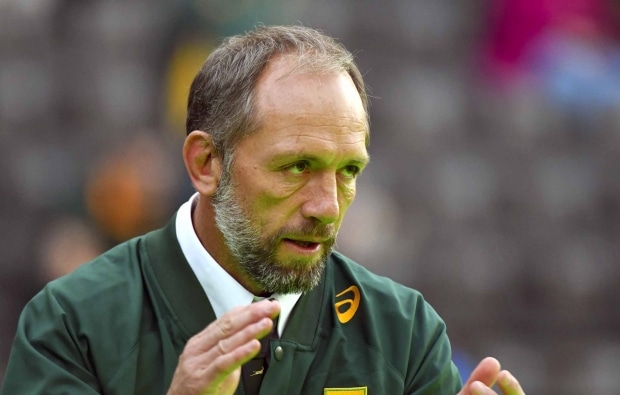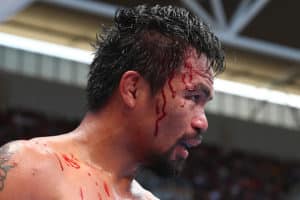The Springboks have embraced uncompromising defence as part of their new team identity and the results have been emphatic, writes JON CARDINELLI.
In 2016, it was plain to see that the Springboks did not want to tackle. Token efforts were made at the gainline. Few, if any, players bothered to get back to their feet quickly after making a defensive hit. There was little to no hustle from those who were asked to chase kicks.
The powers that be realised that conditioning was a problem. Then Allister Coetzee and company saw that a significant tactical and cultural shift was needed if they were going to improve in the most important facet of modern rugby.
Fast forward to the present. The Boks recently completed a 3-0 series whitewash of France. There’s been a lot of talk over the past three weeks about a change in culture and attitude within the camp.
The players have given defence coach Brendan Venter – who joined the management team on a consultancy basis earlier this year – a lot of credit. They have spoken again and again about their newfound love of defence, and how a strong defensive performance in a Test match points to a strong team culture.
In the aftermath of the Test at Ellis Park on Saturday, Coetzee stated that the success was down to the collective, rather than any one individual. And yet, having seen how the Springboks struggled on defence in 2016, and having witnessed first-hand how they have made a shift in training and in Test matches over the past three weeks, one is forced to reach the conclusion that Venter has made all the difference to the team’s attitude and approach.
ALSO READ: Venter to stay with Springboks
Every Bok player I’ve spoken to has acknowledged Venter’s input. There’s been a buzz at training these past three weeks, and Venter has been at the heart of that. Players are talking to each other. They’re spurring each other on. The effort that goes into a defensive drill is similar to that which one sees on game day. This wasn’t apparent in 2016.
The stats of the past three Tests also tell a story. The Boks have not been especially clinical, and certain individuals have performed, while others have struggled. What’s been encouraging to see, is that the desire to maintain the defensive shape is there, as is the hunger to dominate the gainline battle.
The Springboks conceded only four tries and 41 points over the course of the three-Test series. Many of the tries they scored against France were the product of strong defensive work or vision.
Indeed, who could forget that play in the second Test at Kings Park: the tackle by Jan Serfontein that forced France flyhalf Francois Trinh-Duc on to the back foot, and then the intercept by Siya Kolisi that led to a try.
According to the stats on alloutrugby.com, Eben Etzebeth, Serfontein and Franco Mostert finished the series with 47 tackles apiece. Kolisi made 42, as well as the most dominant hits (10) and turnovers (five) across the three games. Jean-Luc du Preez featured as a sub in two of the three Tests, but still managed to make nine dominant tackles.
The defensive performance in the second Test was an improvement on the display in the first. Collectively, the Boks’ tackle success rate was 85% in Pretoria. The hosts made a whopping 217 tackles in Durban, and what was really encouraging to see, was the success rate (89%). The Boks’ defensive performance dipped in Johannesburg as they completed 83% of their tackles.
The dominance of the Bok pack has allowed the backline to flourish in this series. With the benefit of front-foot ball, Elton Jantjies took some excellent tactical decisions and Serfontein got his team across the advantage line more often than not.
That said, there have been problems out wide, problems that Venter himself has acknowledged. France made easy metres in the wider channels, and were particularly successful when they targeted Raymond Rhule. The diminutive Cheetahs wing, who has had his issues under the high ball and on defence throughout the Super Rugby season, missed more tackles than any other player in the recent Test series (11).
The balance of the back three will need to be addressed in the lead-up to the Rugby Championship. The role of Venter, one of the chief architects of the recent resurgence, will also need to be clarified.
On Saturday, Coetzee said that Venter would be staying on with the Springboks as a consultant. He did not specify the length of Venter’s tenure or how it would impact on his existing role with Italy, a side he is contracted to until the end of the 2019 World Cup.
It’s believed that Rassie Erasmus will take up a director of rugby role at the Boks in the near future. Jacques Nienaber, who transformed the Stormers into a crack defensive unit between 2010 and 2012 and was involved with the Boks briefly in 2016, is also expected to return to the management team. At this stage, it’s unclear how these recruitments will impact on the role of Venter.
What has been clear over the past three weeks, is that the Springboks have made a significant cultural shift and that defence is a priority again. While they shouldn’t be talked up as Rugby Championship title contenders just yet, they deserve some credit for the improvements they have made.
Photo: Anne Laing/HM Images





